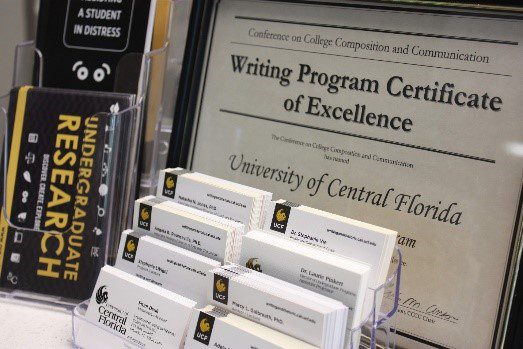by Amanda Costanzo
What’s your major?
We’re all asked this question over and over again, from our family or friends or other students we run into. Usually the answer is pretty straightforward; but for some of us, our answer lifts eyebrows and only prompts more questions. When I’m asked what my major is and I say that I’m studying Writing and Rhetoric, no one ever knows what I’m talking about. Writing is the obvious bit, but what about rhetoric? People have tried to guess what it is. Most think it has something to do with journalism. Others think it’s about creative writing. But actually, it’s about all of those areas, and then some.
What exactly is rhetoric, anyway?
Rhetoric is something we all use all the time, and yet it’s not something many people know much about. Most people don’t even know what it means. Some people I’ve talked to had never heard the word before, and it was actually a struggle to narrow “rhetoric” down to a single definition.
The heart of rhetoric is language, and language isn’t just words on paper. It’s pictures, emojis, body language, dialect and grammar, and even the thousands of memes that wind their way into our everyday conversations. Rhetoric is how we use language: the art of manipulating it to fit the needs of our audience. It’s how we communicate with one another, and how we craft our words to deliver a clear message. It’s how we caption our Instagram pictures, phrase our Facebook posts, and write our school papers. It shows that adapting language is part of everything.
What does the major offer?
There’s a lot that you can do with rhetoric, and the Department of Writing and Rhetoric (DWR) is designed to help you gear your education through specific courses that will most benefit your career goals. Even if you think your field seems to have nothing to do with writing, the DWR’s professors and advisors are more than willing to help you find your way. Do you want to get into publishing? Law? Business? Health? Teaching? Or marketing? There are courses in the program for everyone that cover these fields, and much more. And if you want to pursue a different major entirely, the minor and certificate programs in Writing and Rhetoric offer the same benefits of the major as well.
Writing and rhetoric isn’t only for authors, as some people might imagine. It’s for everyone and can be used for anything. Writing and rhetoric is everywhere, and no matter what you do, you’ll use it. I know so many people in the major, minor, and certificate program that are a part of various other fields, and it’s refreshing to see so many different people who have an appreciation for writing and rhetoric.
Where will you go with this major?
I’m a major in the field with a minor in Creative Writing, and the classes I take in Writing and Rhetoric are helping me delve into the world of fiction writing and publication. I’ve taken classes on editing and grammar, professional writing and publication, and a class on how to market my own writing. But not everyone’s path is the same. Someone with a focus on social media might take classes like Cultural Rhetoric or Writing for Multimedia. Someone majoring in health and science might take a class like Writing for Health and Medicine. If you need it for your field, Writing and Rhetoric has it.
The friends I have in the major are going in all kinds of directions, everyone with their own unique path they’ve created. A few friends went on to law school, taking what they learned about choosing their words and manipulating language to get their message across in the most effective way possible. Others have gone in a more social direction, getting involved in media movements and blogs by using cultural aspects of writing and rhetoric. In my first semester in the major, a group from my Civic Engagement class banded together to create an event, Crisis on Campus, which brought awareness to different issues students had around UCF. Among the many people there were musicians and key note speakers, who focused on a variety of areas—from sexual awareness to student housing.
My own experience in Writing and Rhetoric has been amazing. I’ve gained a lot so far, both from the classes I’ve taken and the people I’ve met along the way. I’ve learned things I didn’t quite expect. I’ve grown as a writer and a critical thinker. My shell has started to crack, and I feel like I’m more prepared to get out into the real world and contribute my ideas. Though our department may be the oddball of UCF, I wouldn’t have chosen another major because this one has all I need. And maybe you’ll find something in it that’s useful for you, too.
Where can I find the DWR? How can I get involved?
Don’t fret if you’re not in any of the DWR programs, there are ways to get involved and learn! Take a few classes on the side and see how you like it. I guarantee you’ll get something out of them, even if it’s just a different and interesting experience than what you’re used to. Some classes like Professional Editing and Rhetorical Grammar are always useful no matter what field you’re pursuing. The Writing and Rhetoric webpages, writingandrhetoric.cah.ucf.edu and https://ucfwritingandrhetoricbs.wordpress.com, have lots of information about the major, minor, and certificate program, whether you’re invested in the major or are still exploring your options.
The University Writing Center (UWC), located on the first floor of the new Trevor Colbourn Hall, is also a handy resource filled with student tutors (many of them part of the DWR) who are eager to look at any of your projects and assignments to help you improve your writing. Even if you just need help with brainstorming ideas for a story, they’ll be there to help you. No matter the subject, you’ll leave with more than you came with and be more confident in your capabilities. Even the tutors who work there have used the UWC for their own writing—and they recommend it to everyone.




